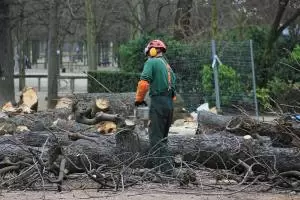
What Does a National Park Service Technician Do?
National Park Service Techs work to preserve and improve the quality of lands they have been hired to protect. Some of these areas include forests, wetlands, mountains, and more.
National Park Service Techs protect the area they are assigned by assessing the risk of forest fire and other environmental disasters. Collecting data on soil, water, and air quality, as well as samples of wildlife and plant life, can help determine these risks. They also perform several other general maintenance activities, including marking trees to be cut, tracking wildlife, help suppress forest fires when they break out, and performing routine trail and campsite maintenance.
National Park Service Techs will often work with conservationists to improve the overall quality of the National Park lands.
Where Does a National Park Service Tech Work?
National Park Service Techs spend the majority of their time outdoors, sometimes battling adverse weather conditions and challenging terrain. Some National Park Service Techs may be required to work in remote locations that will involve long periods of isolation and engaging in arduous physical labor, such as walking long distances. If a National Park Service Tech works with a logging operation, they will be required to work around heavy machinery that is potentially dangerous.
Local, state, and federal governments employ most National Park Service Techs, though the Federal government provides the largest number of positions.
What Is the Average National Park Service Tech's Salary?
National Park Service Techs, who fall under the broader BLS category of forest and conservation workers, earned a median salary of $30,640 as of May 2020. The low-end earners had a median salary of about $23,400, while the high-end earners had a median salary of $48,700 or more.*
Most National Park Service Techs work full-time. However, seasonal employment is common and when emergencies occur, such as a forest fire, National Park Service Techs may be required to work odd and long hours.
National Park Service Technician Jobs
National park service tech jobs focus on advocating and conserving natural resources, particularly in forests and rangelands. Duties vary significantly from job to job, but the following list includes typical job duties one might encounter as a national park service technician:
- Maintain monitoring systems that help rangers respond to threats
- Notify first response to natural or manmade threats to forest areas
- Combat forest fires
- Perform search and rescue missions on foot, land vehicle, snowmobile, and by air
- Patrol forest regions on foot or in vehicles, snowmobiles and by air
- Ensure that visitors to the area have the supplies and skills they need to be successful in their visit
- Ensure that visitors to the area comply with state laws in regards to hunting, fishing and camping
- Enforce state and federal laws in regard to hunting, fishing, and camping
- Educate the public on relevant regional conservation issues
- Create and facilitate safety programs, seminars and initiatives
- Hire and train volunteer staff
- Provide technical services and information to landowners and government policy makers
- Assist with state lands management
- Create environmental field reports
- Work in remote locations in all weather conditions
- Process specimens and samples from the region
- Access or create data for survey, measure, and map forest areas and access roads using GIS or land technology
- Assess new growth areas and rehabilitated areas
- Use herbicides, silvicides, and insecticides for pest, weed, and disease control
- Perform maintenance and construction activities on facilities and equipment
Senior national park service techs will likely be offered the role of team lead at some point in their career. Some of the additional tasks that accompany this senior position are:
- Manage response protocols to natural or manmade threats in parks
- Facilitate search and rescue missions through data, tracking, equipment, and human resources
- Schedule and deploy a patrol schedule that best uses park equipment and human resources
- Create an enforceable policy that regulates visitors to the area and is in line with state regulations
- Create and deploy safety programs for employees and visitors
- Note and work to remediate staffing, equipment and funding shortfalls
- Act as a point of contact for adjacent landowners on a ‘good neighbour' basis
- Consult with policymakers regarding regulations which may impact the park
- Manage park lands
- Oversee forest inspections and environmental reporting/data recording
- Deploy teams to remote locations in all weather conditions with appropriate training and resources
- Act as a liaison with local and state emergency services
- Oversee the mapping of forest and access roads using technology and human resources
- Assess new growth or rehabilitated forest areas; report to stakeholders
- Order the use of herbicides, silvicides, and insecticides for pest, weed, and disease control
What Is the Job Demand for National Park Service Techs?
Job demand for National Park Service Techs is expected to decline by 8% within the next 10 years (2020-2030). Most of the new jobs are projected to appear from federal and state governments.*
What Are the Educational Requirements to Become a National Park Service Tech?
National Park Service Techs are usually expected to have an associate's degree in forestry, conservation, or other related field. These can be obtained from either a community college or technical school. Employers typically favor Techs that possess degrees from programs that have been accredited by the Society of American Foresters (SAF). Each state has at least one of these programs.
Coursework for those that wish to become National Park Service Techs should include ecology, biology, environmental science, forest resource management, and/or geographical computer modeling.
National Park Service Tech - Related Degrees
What Kind of Societies and Professional Organizations Do National Park Service Techs Have?
National Park Service Techsand those who wish to become National Park Service Techs can look to the following government sites for guidance:
- The U.S. Forestry Service
This agency of the U.S. Department of Agriculture deals with everything relating to the National Parks. They are also leading some of the country's most expansive research studies on conservation and forest maintenance. The website can be a great resource for staying updating on the latest forestry laws and regulations. They can also be a valuable resource for jobs.
National Park Service Techs can also browse through these organizations and websites for valuable resources:
- Society of American Foresters (SAF)
SAF is a professional organization that brings the forestry community together for the sake of education. The group provides information to aid National Park Service Techs about cutting edge environmental technologies, the ethical debates currently brewing in the industry, and the latest management techniques. In addition, SAF provides guidance on how to find and obtain a career in forestry.
- Ecological Society of America (ESA)
The ESA is a nonprofit consisting of environmental scientists from around the globe that are working towards the common goal of raising public awareness about the importance of the environmental sciences and promoting widespread information in the field. They put together a great collection of reference and promotional materials that can be of use to those currently in the industry or those looking to break into it.
- Forest Products Society
A nonprofit association formed to provide a network of industry-specific information about the industrial uses of forest materials. This can be potentially useful for National Park Service Techs that are seeking some of the more rare careers in the private sector.
*2020 US Bureau of Labor Statistics salary figures and job growth projections for forest and conservation workers reflect national data not school-specific information. Conditions in your area may vary. Data accessed September 2021.





